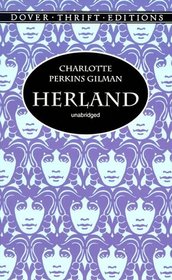Helpful Score: 3
Gilman's feminist utopia highlights the author's ideas about women and her hopes for the future. Certainly she makes her point, and her essentialist take on gender relations will appear simplistic to most contemporary readers...but she uses humor and an honestly interesting-in-its-own-right plot to draw the reader in and keep the reader engaged.
Helpful Score: 2
What would you do if you were a man who suddenly found himself captured by an all woman society. Three men have different responses in this book. I found it a great read although the amazon reviews are somewhat dismal.
Gives insight into early 20th century feminism; not always a pretty picture. Gilman advocates eugenics alongside socialism and gender equality
Some books attract my attention by an intriguing title, others because the author has been previously unknown to me, yet some by their unique subject matter. This one combines all of these attractions: unknown author, unknown book; a title to wonder about (similar to Edward Abbott's Flatland); subject a feminine utopia. Will her vision track the fate of More's Utopia (1516), or of Butler's Erewhon (1872), or will it presage Ayn Rand (Anthem, 1938), and Zamiatin (We, 1924)?
There are also some similarities to Conan Doyle's The Lost World (1912) in its setting, discovery, and escape. I am also reminded of others that followed: H. G. Well's The Valley of the Blind ( ), and Burrough's Caspek (1918) trilogy. This is certainly a unique tidbit that an aficionado should not bypass.
There are also some similarities to Conan Doyle's The Lost World (1912) in its setting, discovery, and escape. I am also reminded of others that followed: H. G. Well's The Valley of the Blind ( ), and Burrough's Caspek (1918) trilogy. This is certainly a unique tidbit that an aficionado should not bypass.




